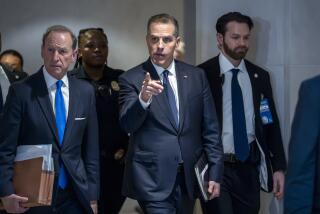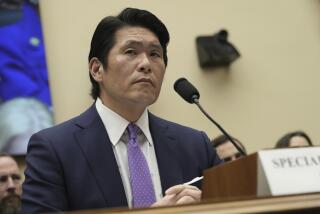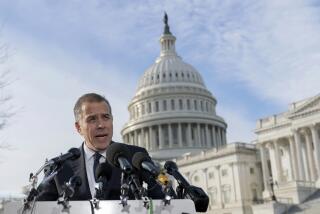Legal Fears May Have Silenced Key Figure in FBI Files Case
- Share via
WASHINGTON — A central figure in the FBI files case may have refused to testify before a Senate committee last week because he feared he would be asked about his unauthorized use of his own background file, legal sources and congressional investigators said Friday.
Anthony Marceca, who worked in the White House personnel office when 600-plus FBI background files on past and present White House employees were improperly obtained, has acknowledged in court papers that he learned from his own background file the names of two women who made critical comments about him to the FBI.
After seeing the file, Marceca sued the two women for defamation.
Marceca maintains that he hurriedly read his file after it accidentally dropped to the floor along with other background files at the personnel office.
Marceca’s explanation could constitute an admission that he violated federal privacy laws by examining confidential FBI interviews and then using their contents against people who were mentioned in them.
The suggestion that Marceca is primarily worried about the possibility of incriminating himself provides an alternative explanation for his refusal to testify before the Senate Judiciary Committee. Some critics have argued that his decision to invoke his 5th Amendment rights suggests that he is trying to protect higher-ups in the White House.
“It is telling that Mr. Marceca may believe all the testimony he gives may be incriminatory,” said Sen. Orrin G. Hatch (R-Utah), chairman of the judiciary panel. “This is not an innocent bureaucratic snafu.”
Marceca’s reliance on the 5th Amendment was unexpected. He already had testified about the FBI files before a federal grand jury looking into aspects of the case, and had appeared before a House committee only two days before his scheduled Senate testimony. In addition, he gave sworn statements on the matter to both congressional panels.
Sen. Arlen Specter (R-Pa.), one of the toughest questioners on the judiciary panel, said he doubts Marceca’s refusal would withstand a court test because he had testified previously without invoking the 5th Amendment.
Specter said Marceca’s situation is analogous to a recent case decided by the U.S. Court of Appeals for the District of Columbia. The court held, in Specter’s words, that “when someone testifies before a grand jury without involving the [5th Amendment] privilege, he may not then invoke it at trial.”
On June 28, the day Marceca was to testify before the Senate panel, the Wall Street Journal published a report disclosing that Marceca had given a sworn statement last year in connection with a $100,000 defamation suit he had filed in federal court in Austin, Texas.
“The only thing that changed” between Marceca’s House testimony and his scheduled Senate appearance, “was news about his lawsuit in Texas, and that he had acted on information in his FBI file,” said a congressional investigator who declined to be identified. “I think he had some problems there.”
In a sworn statement in the lawsuit, Marceca acknowledged that he had seen his own background file. He also stated that D. Craig Livingstone, his former boss in the personnel security office, had declined to show it to him.
Livingstone resigned from the White House on June 26, apologizing for his role in obtaining the FBI files. Livingstone accepted responsibility for failing to supervise the office, but he insisted there was no wrongdoing.
In his sworn statement, Marceca said he saw his own file when he was visiting Livingstone at the White House on Sept. 11, 1994, six months after returning to his regular post as a civilian investigator for the Army.
At one point, Marceca said, Livingstone stepped away to take a phone call. Marceca said he picked up a newspaper and knocked some background investigation files to the floor. Picking them up, he said he noticed that the last one was his. He said he read it quickly and discovered the names of the women he eventually sued.
Marceca said he returned the file to the pile with the others before Livingstone returned.
In his statement, Marceca denied any wrongdoing in examining his own file. “That was the fickle finger of fate that that would fall on the floor,” he said.
Livingstone, asked about the episode during his Senate testimony, responded: “It doesn’t seem possible to me. I don’t recall meeting with Mr. Marceca as he describes it.”
Livingstone said the presence of “unresolved” issues in Marceca’s FBI file, which he declined to discuss, led then-White House lawyer William H. Kennedy III to decide against keeping Marceca in his White House job.
Some observers doubted that Marceca could have violated federal privacy laws because potential liability would be limited to the person responsible for providing the data, in this case Livingstone. Moreover, because the White House is not considered an “agency” under the Privacy Act, it is not covered by the legislation’s sanctions.
Robert F. Muse, Marceca’s Washington attorney, would not disclose the reason he had advised his client to invoke the 5th Amendment. But legal sources close to the case said Marceca did not want to repeat under oath what others regarded as a preposterous account.
Congressional lawyers said the Senate committee could compel testimony from Marceca by granting him immunity from prosecution. Then if he still refused to testify, he could be held in contempt of Congress.
But that course appears unlikely because Whitewater independent counsel Kenneth W. Starr has informed the panel he would strongly oppose a grant of immunity to such a key figure in an investigation he is vigorously pursuing.
Marceca is the only individual named in a court-approved mandate received by Starr, but the investigation clearly would cover any others involved in illegal acts.
More to Read
Get the L.A. Times Politics newsletter
Deeply reported insights into legislation, politics and policy from Sacramento, Washington and beyond. In your inbox twice per week.
You may occasionally receive promotional content from the Los Angeles Times.










